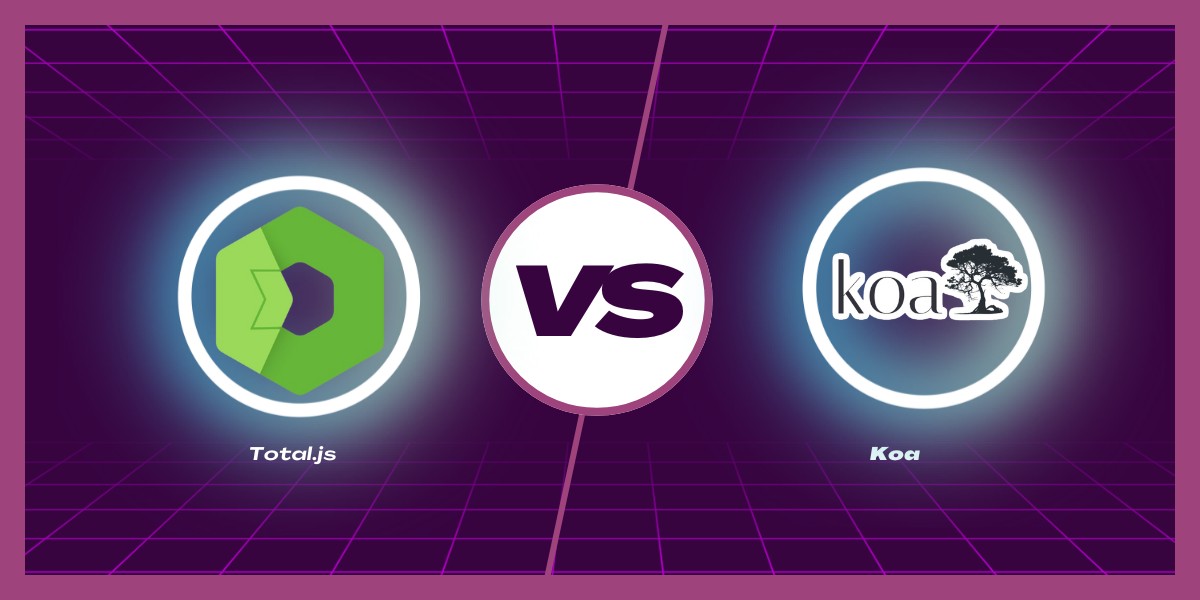In this article, we’ll provide a comprehensive performance comparison between Total.js and Koa, two lightweight frameworks designed for performance and simplicity.

Performance Testing: Total.js vs. Koa
When building high-performance Node.js applications, choosing the right framework can significantly impact your application's scalability, response times, and overall efficiency. In this article, we’ll provide a comprehensive performance comparison between Total.js and Koa, two lightweight frameworks designed for performance and simplicity.
Why Compare Total.js and Koa?
- Total.js: Known for its all-in-one philosophy, Total.js is optimized for speed and lightweight performance, making it a top choice for applications where efficiency is critical.
- Koa: Developed by the creators of Express, Koa is a modern framework designed for middleware chaining and a minimalist approach to building applications.
Both frameworks aim for minimalist architecture, but this comparison will highlight which one excels in handling concurrent requests and providing faster response times.
Test Methodology: Fair and Accurate Comparisons
To ensure fairness in our benchmarking, we used the same hardware and testing tools, simulating real-world stress conditions to measure the following metrics:
- Response Time: Time taken to process requests under load.
- Requests/sec: Number of requests the framework can handle in one second.
- Resource Usage: Memory and CPU consumption under stress.
Hardware and Testing Environment
- Machine: iMac Intel Monterey, 12GB RAM
- Node.js Version: v21
- Testing Tool: wrk (a powerful HTTP benchmarking tool)
Step-by-Step Code Setup
1. Setting Up Total.js
Step 1: Create the project folder and install Total.js:
Step 2: Create a basic server in index.js:
Step 3: Start the Total.js server:
2. Setting Up Koa
Step 1: Create the project folder and install Koa:
Step 2: Create a basic server in index.js:
Step 3: Start the Koa server:
Running the Performance Test
With both servers running on their respective ports (8001 for Total.js and 3000 for Koa), we executed the following benchmarking command for each framework:
Performance Results
Here are the benchmarking results after running the test:
| Framework | Avg Latency | Requests/sec | Transfer/sec | |
|---|---|---|---|---|
| Koa | 13.41ms | 2018.40 | 346.91KB | |
| Total.js | 4.75ms | 2602.94 | 551.60KB |
Key Observations
- Faster Response Time:
Total.js outperformed Koa with an average latency of 4.75ms, compared to 13.41ms for Koa.
- Higher Requests/sec:
Total.js handled 2602.94 requests/sec, while Koa managed 2018.40 requests/sec, showcasing Total.js' superior concurrency handling.
- Greater Data Throughput:
Total.js achieved a higher Transfer/sec rate of 551.60KB, almost 60% more than Koa.
Why Choose Total.js?
Balanced Performance
Total.js has consistently demonstrated solid performance, especially in its latest v5 iteration, handling 7,010 requests per second with low latency and minimal dependencies. While it may not always dominate performance benchmarks, Total.js strikes an impressive balance between speed and modularity, making it a valuable choice for developers seeking both efficiency and flexibility in one package.
Peter Sirka, the founder of Total.js, reflected on this balance in response to performance comparisons:
"That's OK... Total.js has more features implemented in the web server than Koa. That's logically going to reduce performance. But the numbers are still quite good, considering the vast functionality Total.js provides out of the box."
This perspective underscores the deliberate design trade-offs in Total.js, where a rich feature set complements competitive performance, ensuring that developers don’t have to sacrifice versatility for speed.
A Unique Design Philosophy
Total.js distinguishes itself in the Node.js ecosystem with a singular vision, shaped by over a decade of continuous development since 2013. Unlike many modern frameworks that depend on external libraries, Total.js is built entirely in pure JavaScript, embracing an "all-in-one" philosophy. This independence reflects a commitment to Elon Musk’s "first principles" approach: breaking down web development to its fundamentals to ensure every feature is purpose-driven.
This philosophy means Total.js avoids the trend of integrating third-party dependencies unnecessarily. Instead, every module in Total.js is handcrafted, challenging existing norms to assess whether they truly add value or merely follow popular conventions. This focus on minimalism, efficiency, and control gives Total.js unparalleled stability and makes it one of the most optimized frameworks for building high-performance, maintainable applications.
Conclusion
If your project prioritizes performance, scalability, and a seamless developer experience, Total.js emerges as the superior framework in this comparison. With its impressive speed and all-in-one capabilities, Total.js proves to be an excellent choice for high-performance Node.js applications.
Download the complete test setup and scripts here to run your own benchmarks.
- Total.js: Total.js Framework
- Koa: Koa Documentation
Other posts from Total.js Platform
- 2026-02-02January report 2026
- 2026-01-02December report 2025
- 2025-12-15Totally Merry Christmas and a Happy New Year 2026!
- 2025-12-01November report 2025
- 2025-11-02October report 2025
- 2025-10-22New universal drivers for IoT Platform
- 2025-10-13IoT Platform Update: New Features and Enhancements
- 2025-10-01September report 2025
- 2025-09-05How to create Google Gemini AI component in Total.js Flow
- 2025-09-01August report 2025

